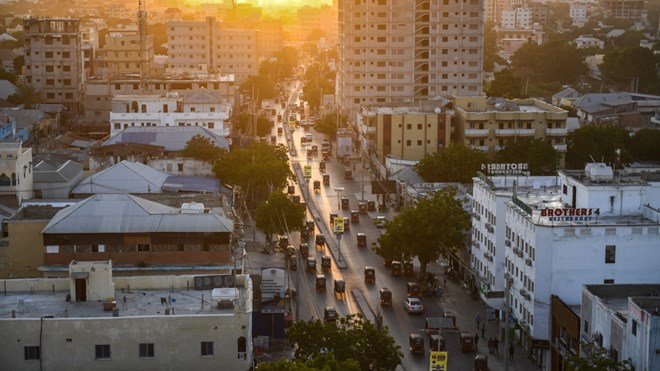
Tuesday April 16, 2024
East African Community member states must support Somalia’s efforts to curb destabilising criminal markets.

AMISOM Photo / Mukhtar Nuur
On 15 December 2023, Somalia took a step closer to joining the East African Community (EAC) by signing the treaty to become the bloc’s eighth member. The move could benefit Somalia and its fellow members immensely, but only if the entrenched criminal markets that threaten Somalia’s stability and economic recovery are dismantled.
For existing EAC states, benefits include greater competitiveness for foreign direct investment. Reducing tariff and non-tariff barriers, opening cross-border trade, creating new business opportunities in Somalia, and integrating into regional infrastructure projects will boost trade in the region. The EAC’s eastern boundaries will stretch from the southern Indian Ocean up to the Gulf of Aden – a vital global maritime route – enhancing cooperation with major world powers on security, trade and geopolitics.
For Somalia, joining the EAC will provide access to a market of 283.7 million citizens, free movement of its people around the bloc, and the economic benefits of regional integration. This would be a shot in the arm for its post-conflict recovery and reconstruction.
However Somalia is grappling with weak governance, instability, violent extremism and transnational organised crime. After decades of state fragility, the country is fertile territory for criminal markets ranging from arms and human trafficking to extortion, environmental crimes, piracy, money laundering and illicit financial flows. These complex and often intractable problems will likely impede Somalia’s successful integration into the EAC.
When piracy peaked off the coast of Somalia between 2005 and 2011, it took concerted efforts by world naval powers to stop the attacks. Now piracy again threatens the Gulf of Aden due to the ongoing Gaza conflict.
Before the conflict, around 22% of containerised shipping and 12% of global trade passed through the Red Sea. In recent months, Houthi rebels in Yemen have attacked and hijacked vessels deemed affiliated with Israeli, European and United States (US) ships in protest against Israel’s attacks on Palestine. This evolving maritime conflict has forced ships to re-route, delaying the delivery of goods and hiking prices to the detriment of Somalia and other EAC members.
Somalia’s inability to manage its ports effectively makes the coastline a haven for arms traffickers who stockpile weapons for terrorist groups and clan militias. US sanctions against groups and individuals show the intricate transnational smuggling networks in Somalia, the Gulf region and Iran.
A United Nations expert panel has questioned the Somali government’s ability to track weapons, curb illicit flows to terrorist groups and organised criminals, and control arms trafficking along its coastline. Due to porous harbours and corrupt deals between government officials and traders, Somalia is awash with counterfeit goods. These are smuggled into the country and onward into East Africa through elaborate networks.
Somalia is also both a source and transit country for human trafficking and smuggling. High levels of unemployment, insurgency-linked humanitarian crises and climate-induced disasters are causing thousands to flee to neighbouring countries, the Gulf region and Europe. Similar numbers are displaced within the country.
Al-Shabaab, with its links to al-Qaeda, raises around US$100 million annually through roadblock ‘tolls’, extortion and illegal charcoal sales. The income funds the group’s terror operations, which undermine Somalia’s judicial, financial and security infrastructure and regional stability.
Although the federal government’s capacity to curb money laundering and illicit financial flows is growing, it is still inadequate. There are fears that the free movement of people and labour within the EAC will allow terror operatives to infiltrate other countries and expand their attacks.
The impending withdrawal of the African Union Transition Mission in Somalia (ATMIS) by December 2024 could create a security vacuum that terrorist groups might take advantage of. EAC membership could assist since some of the main countries contributing to the mission are member states. Somalia could request the deployment of EAC standby forces to fill the void as the country works to strengthen its security forces.
There are several ways in which the EAC can help Somalia deal with transnational organised crime. Regarding maritime threats, Kenya could leverage its membership in the Combined Maritime Forces – the multinational naval partnership that promotes security and prosperity across 5.1 million square kilometres of international waters.
Using its One-Stop Border Posts and other migration policies, the regional bloc could help build the capacity of Somali institutions to curb human trafficking flows and attendant crimes. For its part, Somalia needs to align its migration policy with that of the EAC by improving cross-border surveillance, screening immigrants and completing registration at points of entry.
Dr Hassan Khannenje, a Horn of Africa expert, told the ENACT organised crime project that ‘joining the EAC will allow Somalia to learn from successes, challenges and regional best practices about controlling illicit financial flows. EAC member states will be better placed to share financial intelligence and track money laundering and terror financing than ever before.’ This suggests immense benefits to be gained from Somalia joining the Eastern and Southern Africa Anti-Money Laundering Group.
As Somalia prepares to deposit its instrument of ratification with the EAC’s Secretary General, EAC member states should consider how toprevent Somalia’s transnational organised crime challenges from spreading into the region.
This article was first published by ENACT.